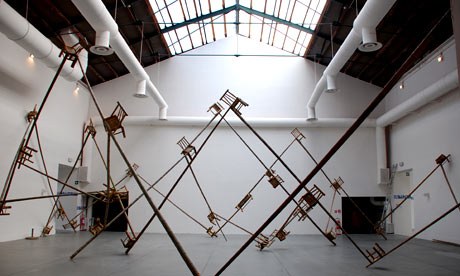From the Guardian:
The announcement that the Chinese artist Ai Weiwei is to be the next artist to take on Tate Modern’s annual Turbine Hall commission is unsurprising – though surprise, spectacle and a kind of art that is accessible to the widest possible public are what the Turbine Hall demands, even if the spectacle is of a quiet or understated sort. Subtlety and artistic sophistication are a bonus. The most successful Unilever commissions have not necessarily been the easiest, and the Turbine Hall is a tough testing ground for any artist. Subtlety and artistic sophistication are a bonus. But Ai Weiwei’s work is as often controversial as it is provocative. It is also – undeniably – fun. He fits the bill perfectly.
Most recent Chinese art has seemed at best secondary, at worst made cynically for the western art market, the kind of objects whose technical skill exceeds their interest. Much of the painting and sculpture one sees coming from China is mere product. Ai Weiwei is an exception, but how exceptional he is as an artist – he is also an architect, designer, curator and critic – is often obscured by his position in his homeland, where he is regarded as a sort of cultural irritant. He is an outspoken critic of government and officials, of state corruption and greed. His blog has been closed down, his bank accounts investigated, and last year he was beaten by the police for trying to testify in favour of a colleague with whom he was investigating casualties of the 2008 Sichuan earthquake. He later suffered a cerebral hemorrhage. Having collaborated with Herzog and de Meuron – also the architects who transformed the Bankside power station into Tate Modern – on the Bird’s Nest stadium for the Beijing Olympics, he went on to boycott the event, and criticize western artistic involvement.
See also past CDT posts on Ai Weiwei.
Read also: Chinese artist Ai Weiwei makes Internet his medium from Reuters:
Ai, 53 this year, has become an increasingly vocal critic of China’s Internet controls, helping to plan an Internet boycott on the day China was to require use of the controversial Green Dam filter, a program the government wanted installed on every new computer.
That boycott turned into a party in Beijing’s art district after regulators seemed to back down from the filter requirement.
Ai has never been arrested. He gets away with being outspoken because of the prestige of his father, poet Ai Qing, because he picks his battles carefully and because his own art has brought wealth and fame overseas.







